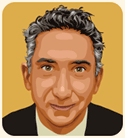I swore I wouldn’t write another blog on the Summit. In fact, I had even urged the AQ staff to move on—that it wasn’t that important. And yet here I am with an insatiable desire to slake my thirst for just one more blog post.
And it is this: the media sorely missed the story of the Summit. Despite what you saw in the media, the real events that indicate the direction hemispheric relations are heading were: 1) Obama’s side-by-side lunch with Uribe in which they chatted like allies and swapped notes; 2) Obama’s priority of the issues of human rights and democracy in his volley back to Cuba’s Raúl Castro (to which Raúl’s big, bearded brother, Fidel, responded significantly, “Did we say everything was on the table? Democracy, human rights, political prisoners? We take that back”); and 3) the U.S. President’s last-minute finger wagging at Venezuela’s most powerful book club leader.
Everyone twisted themselves into contortions interpreting the handshake between Presidents Obama and Chávez’ stage-stealing handing of the book to President Obama.
Even the Wall Street Journal’s Mary O’Grady jumped into the fray on Monday, April 27th with an unnecessarily-long denunciation of Eduardo Galeano’s Open Veins. Most 30 and 40-something Latin Americanists recognize it for what it is: a cartoonish screed that places all responsibility for Latin America’s ills on colonialists and imperialists. And I suspect that it will be gathering dust (if that) on Obama’s bookshelf much as it is on everyone else’s who was forced to read it.
And then there’s the whole over interpretation of the Obama-Chávez handshake. Everyone’s a twitter with whether he should have or shouldn’t have. Honestly what else could he have done? To paraphrase the famous saying, “Sometimes, Mr. Freud, a handshake is just a handshake.”
But here’s the real story. Out of the public spotlight or the media’s scandal-mongering eye, there were moments of real significance.
First, Obama’s lunch date with President Álvaro Uribe of Colombia. President Obama didn’t grant any bilateral meetings, but he made sure he was seated next to President Uribe and they passed notes, which President Uribe waved proudly around afterwards to the media with Obama’s signature. Not coincidentally President Obama later urged that there be a review of Colombia and its free trade agreement.
Second, beyond the atmospherics the topic of Cuba really had little bearing on the Summit. It was really only pushed by a handful of countries, and was never officially on the agenda. As I’ve said before, it’s sad to see Latin American countries who for decades have complained about how the U.S. filters its relations with the region through the prism of Cuba, do the exact same thing—but with less noble means. Their goal: normalize relations with a country that hasn’t budged an inch on democracy and human rights—two conditions for admission to the OAS and the Summit.
And for those reasons, Obama’s riposte to Raúl’s public relations thrust was subtle and wise. As he said: “They are certainly free to release political prisoners….They’re certainly free to stop skimming money off the top of remittance payments. They’re free to institute greater freedom of the press.”
The ball was back in their court. And that’s when Fidel stepped in to return it with an over-the-top swing that sent the ball out of the court, saying that really they weren’t interested in democracy and human rights.
But that doesn’t mean the U.S should give up. Quite the opposite, it should continue pushing. Truth is: Cuba doesn’t want opening, under any conditions. The regime would wither. And the Castros know that. So let the U.S. offer. And when the Cuban regime refuses to reciprocate, point that out. The world will soon be disabused of the notion that Cuba’s the victim of a U.S.-imposed isolation.
The third is the much-overlooked final encounter between Obama and Chávez. Take a look. There is clearly some serious message delivery there. That isn’t about his disagreement over the book the Chávez delivered to him (“Characters were underdeveloped!” “Filled with old canards.” “Improper footnotes!”) Instead it’s clear that he’s saying that hand shaking and book clubs aside, there are serious disagreements. We don’t know what really transpired. But this is where the rubber of diplomacy hits the road. Shame it didn’t hit the presses—which preferred to focus on a handshake and a ridiculous book.
So for now, out of frustration for the silly way the media covered the event, I’m forced—despite my better intentions—to post another blog about the Summit. But this will be my last. I swear.




